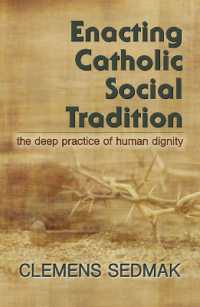Full Description
The traditional image of northern Iberian mountain settlements is that they are largely egalitarian, homogeneous, and survivals of archaic forms of 'agrarian collectivism'. In this book, based both on extensive fieldwork and detailed study of local records, Brian Juan O'Neill offers a different perspective, questioning prevailing views on both empirical as well as theoretical and methodological grounds. Through a detailed examination of three major areas of social life - land tenure, cooperative labour exchanges, and marriage and inheritance practices - in one particular hamlet, the author demonstrates the predominance of forms of institutionalized economic inequality and social differentiation within the peasantry. Situating the local study within a wider European and Mediterranean ethnographic and geographical framework, O'Neill offers a refreshing and challenging way of combining the research methods of anthropology with those of social and economic history. His book will appeal to anthropologists, historians, sociologists, geographers and demographers interested in the present and past social structure of European village communities, as well as to those concerned with the growing links between anthropology and history.
Contents
List of tables; List of figures; List of illustrations; List of plates; Acknowledgements; 1. An 'egalitarian' Iberian community?; 2. Open fields and communal land; 3. Social groups; 4. Cooperative labour; 5. Matrimony and patrimony; 6. Minimal marriage; 7. The fulcrum of inheritance; 8. Conclusion; Appendix I: the landholding survey; Appendix II: social groups in 1851 and 1892; Appendix III: the Parish register; Appendix IV: household structure, 1977; Appendix V: baptisms of bastards, 1870-1978; Glossary of Portuguese terms; Bibliography; Index.








